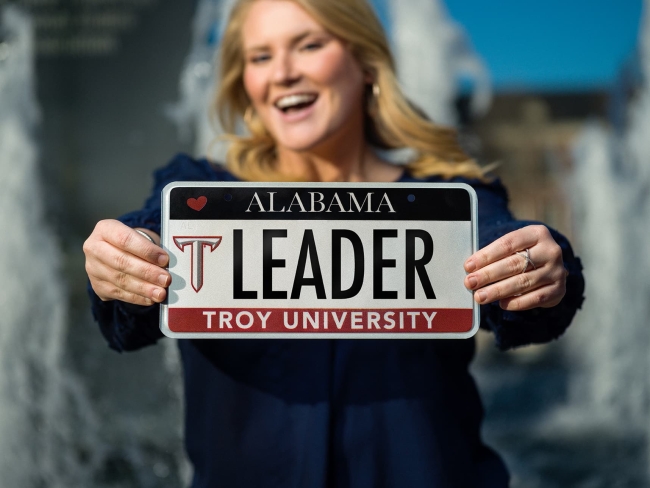You have /5 articles left.
Sign up for a free account or log in.

Through the Department of Motor Vehicles in Alabama, Troy University students, faculty, staff and supporters can order a custom license plate. The funds that benefit the university are allocated to study-abroad scholarships for students.
Troy University
No need to honk if you love college students. Car owners with Troy University-branded license plates have proven their support for students with this special purchase that funds international education each year.
The Troy Car Tag Program at the Alabama institution provides scholarship dollars for The Chancellor’s Award for Global Competitiveness (CAGC) over the past 20 years, which covers student expenses for study abroad each year.
The initiative helps build students’ skills for their careers in a way that is engaging for the community and provides benefits for the plate-holder too.
Behind the wheel: CAGC was created to promote study abroad and global awareness among students at the university through financial support.
“Studying abroad makes students more globally and culturally aware,” says Sarah McKenzie, study abroad director at Troy. “Statistics show that students who have study abroad program experience are more likely to get hired or accepted into graduate programs. It’s very valuable to a student’s future to have experience with other cultures, in knowing how to interact with people and in places that are different from us.”
An April survey from Terra Dotta found 90 percent of students who plan to or who have studied abroad see it as important for their personal and professional development. However, financial barriers can make it difficult for students to participate, so students also say providing scholarships is key to making the experience viable.
Initially, the award was $500, but has grown to $750, then $1,000 and is currently $1,250.
“On average, most of our trips cost around $3,500, so $1,250 knocks off a third of that cost,” McKenzie says. “It still sounds like a lot, but no one is going to give you that opportunity at that price once you leave Troy. Chancellor [Jack] Hawkins wants everyone to have the opportunity to go if they want to.”
To be eligible for the award, students must have a minimum grade point average of 2.5, be a full-time student, have successfully completed at least one full semester at the university and participate in a university-approved study abroad program.
The award is funded primarily through the Troy Foundation’s Troy Car Tag program, which has been running for over 20 years.
Driving toward success: Any licensed motorist in the state can purchase a TROY license plate at their local Department of Motor Vehicles, according to the university’s website.
The plate costs about $50 more than the basic option (though registration costs vary between counties) and the university receives an average of $48 from the car tag purchase. After the purchase, the university sends alumni and community supporters a mailer with details about how their purchase supports current and future students.
Among campus community members, any faculty or staff member who purchases the TROY plate receives a free parking permit and students receive a discounted rate for their parking permit if they buy the tag.
Starting their engines: During the 2022–23 academic year, 301 students participated in 15 faculty-led trips to over a dozen locations, and an additional 15 students participated in an exchange program at six locations worldwide.
Participation has grown over 100 percent in the past six years, which McKenzie attributes in part to additional scholarships the institution can offer study abroad participants.
“When we first started offering the award, students could only receive it once every 18 months,” she says. “Now, it’s been changed to once every academic year, and I have students that are getting it every year.”
In 2005, the first recorded year of car tag sales, over 2,018 motorists purchased a TROY plate. Over the first 11 months of 2023, 8,865 plates were sold, according to data from the university’s marketing team.
McKenzie says she notices cars without a parking permit sticker but a Troy plate as a special kind of supporter. “It’s easy to give back to the students while showing school pride and giving back to future generations.”
Seeking stories from campus leaders, faculty members and staff for our Student Success focus. Share here.




